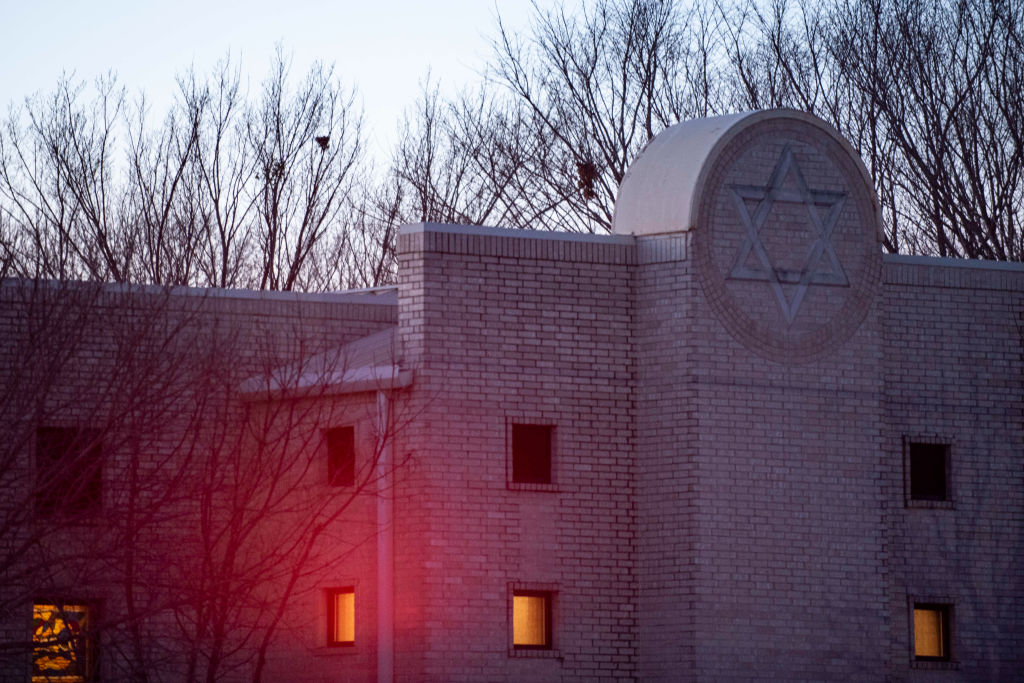
For Jeff Cohen, president of Congregation Beth Israel in Colleyville, Texas, his sense of safety as a Jewish person in America was rocked on Jan. 15 when he and three other members of his congregation were held hostage at their synagogue by a gunman for eleven hours. All the hostages survived the attack, which the FBI went on to investigate as a hate crime and an act of terrorism, but nearly a year later, Cohen says he still feels its impact.
Cohen’s experience was perhaps the most high-profile moment in a surge of attacks targeting American Jews. In 2021, a total of 2,717 antisemitic incidents of assault, harassment, and vandalism were reported to the Anti-Defamation League, a Jewish civil-rights advocacy organization. That number, representing a jump of more than 34% from the previous year, was the highest since the organization began tallying such attacks more than 40 years ago. And while 2022’s numbers have not yet been released, antisemitism made headlines this year as rapper Kanye West, now known as Ye, began a social media spree of antisemitic slurs and when former President Donald Trump dined with Ye and a vocal Holocaust denier.
Now, with Hanukkah beginning on Sunday evening, congregations around the country are getting ready to celebrate what is—though not the most sacred—the most visible Jewish holiday in American pop culture. Celebrants often mark the eight nights (which run from Dec. 18 to 26 this year) by placing a lit menorah in a window of the home, a public declaration of the miracle of the holiday. But at a time when some are fearful to express their faith so openly, doing so can carry a different weight.
“There are people who are nervous,” Cohen says, of Hanukkah plans in his community. “There are people who would have previously gone and done things in a public space, who now won’t.”
It’s a feeling familiar to Rabbi Elliott Tepperman of Bnai Keshet Reconstructionist Synagogue in Montclair, N.J. His community was struck with panic in November when FBI officials warned synagogues across New Jersey that there was “credible information of a broad threat.” Synagogues throughout the state went into lockdown and law enforcement increased patrolling in predominantly Jewish areas until the threat cleared. An 18-year-old was arrested for disseminating the threats over social media, along with a screed sermonizing violence against Jewish people.
“The Jewish community still carries historical trauma in our bodies and in our cultural institutions,” says Rabbi Elliott Tepperman of Bnai Keshet Reconstructionist Synagogue in Montclair, N.J. “So when there is a rise in antisemitism, it’s often the case that we are both reacting to whatever the most current incident is, and to everything that has come before.”
Read more: Modern Hanukkah Traditions Are A Reminder That Extremism Is Always Short-Lived
Dealing with a specific, credible, local threat is a “remarkably different” experience from reading national figures about rising antisemitism in the abstract, he says. Even so, he’s encouraging his congregation to celebrate the coming holiday with full force.
“The most valuable thing we can do to combat antisemitism is to continue to practice and build a vibrant Jewish community,” he says.
Tepperman says his synagogue has installed a giant rainbow-colored menorah on their front lawn, and the group plans to have singing and festivities each night of Hanukkah. They’ve invited the mayor and members of the town council to join them. “We want to give them the opportunity to stand in solidarity with us at a moment when we might be feeling a little bit extra anxious,” he says.
Read more: Inside the Biden Administration’s Response to the Spike in Anti-Semitic Attacks
The rabbi says that “it was extraordinarily moving” when four congregations of other faiths came to support the Jewish community in Montclair last month after the threats cleared, carrying signs that preached love and solidarity.
“Whether this month they’re attacking immigrants or they’re attacking people based on the color of their skin, or they’re attacking LGBT folks, or they’re attacking women, or they’re attacking Jews, we all know that we are going to be in the habit of standing together,” Tepperman says.
Cohen sees that defiant spirit in action in Texas, too. While some people are understandably nervous, others have reacted to the frightening experience by feeling emboldened to take even greater public pride in their heritage. “I know a couple of people who always wear a yarmulke now,” Cohen says.
Cohen believes that to combat antisemitism, people need to stand up against harmful antisemitic tropes—that no matter the time of year, anyone who hears such stereotypes or conspiracy theories should react strongly. With hate playing such a prominent role in our culture, he points out, it’s crucial to remind people, especially young people, that antisemitism is not acceptable.
“If we hear something like that, we don’t believe it, but we roll our eyes or we look away,” he says. “We can’t do that anymore.”
More Must-Reads from TIME
- Cybersecurity Experts Are Sounding the Alarm on DOGE
- Meet the 2025 Women of the Year
- The Harsh Truth About Disability Inclusion
- Why Do More Young Adults Have Cancer?
- Colman Domingo Leads With Radical Love
- How to Get Better at Doing Things Alone
- Michelle Zauner Stares Down the Darkness
Contact us at letters@time.com